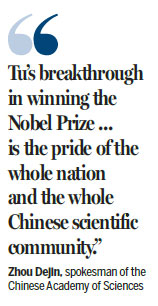
Tu nation's first winner of Nobel Prize in Medicine
Source:China Daily
Shan Juan And Cheng Yingqi
Updated: 2015-10-06
Chinese pharmacologist Tu Youyou, now 85, became China's first medicine Nobel laureate when it was announced she was one of three scientists awarded the 2015 Nobel Prize in Physiology or Medicine for their work in developing effective drugs against parasitic diseases.
William C. Campbell and Satoshi mura were recognized for their novel therapy against infections caused by roundworm parasites.
Premier Li Keqiang sent a message to the State Administration of Traditional Chinese Medicine, congratulating Tu on her award, which he said is representative of China's technological achievements.
Tu was honored for developing Artemisinin, a drug therapy for malaria that has saved millions of lives across the globe, especially in the developing world, the Nobel Assembly at Karolinska Institute disclosed on its website on Monday.
Tu, a Chinese trained pharmacologist and a researcher at the China Academy of Chinese Medical Sciences in Beijing, would like to go to Oslo, Norway in December to receive her award in person, according to Cao Hongxin, the science and technology department head of the State Administration of Traditional Chinese Medicine, and former director of the academy.
"She sounded calm and said she has received lots of congratulatory calls," Cao told China Daily on Monday after he telephoned Tu to congratulate her.
"It's an overdue honor for Tu and the world's recognition of TCM," he said.

Tu was honored for her work in isolating the active ingredient from the plant Artemisia apiacea Hance that protects against the malaria parasite and developing an extraction method for its therapeutic use.
"It was inspired by the ancient TCM classic Manual of Clinical Practice and Emergency Remedies by TCM master Ge Hong of the Eastern Jin Dynasty (AD 317-340)," Cao said.
Her great findings spearheaded the exploration for the modernization of TCM as well, he added.
In 1969, Tu started to chair a government project aimed at eradicating malaria.
"The task I took on was to conduct research for a new drug from traditional Chinese herbal medicine to treat malaria. Back then, we needed a totally new structured antimalarial to deal with resistance to the existing drugs," Tu said in an earlier interview.
Tu and her colleagues experimented with 380 extracts in 2,000 candidate recipes before they finally succeeded in obtaining the pure substance qinghaosu, later known as artemisinin, which became the standard regimen for malaria in the World Health Organization's catalog of essential medicines.
"Your discovery of artemisinin not only explored a new research direction for the treatment of malaria - which has significant scientific meaning - it also directly benefited tens of thousands of people," said Bai Chunli, president of the Chinese Academy of Sciences, in a congratulatory letter sent to Tu on Monday night.
"Tu's breakthrough in winning the Nobel Prize in a natural science is the pride of the whole nation and the whole Chinese scientific community," said Zhou Dejin, spokesman of the Chinese Academy of Sciences.
Contact the writer at shanjuan@chinadaily.com.cn and chengyingqi@chinadaily.com.cn


World Family Summit
The World Family Organization was founded in Europe in 1947 and headquartered in Paris.
Link: China's Central Government / World Health Organization / United Nations Population Fund / UNICEF in China
Copyright 2014 National Health and Family Planning Commission of the PRC All rights reserved






